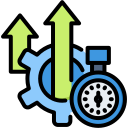Integration Patterns That Keep Momentum
Standardize connections to CRM, ERP, and identity services using versioned APIs and reusable connectors. This avoids point-to-point tangles and lets citizen developers build confidently on stable abstractions curated by the platform team.
Integration Patterns That Keep Momentum
Replace scheduled polls with events from your systems of record. Low-code flows respond instantly to changes, reducing latency and resource waste while improving visibility across processes that span multiple applications and business units.






